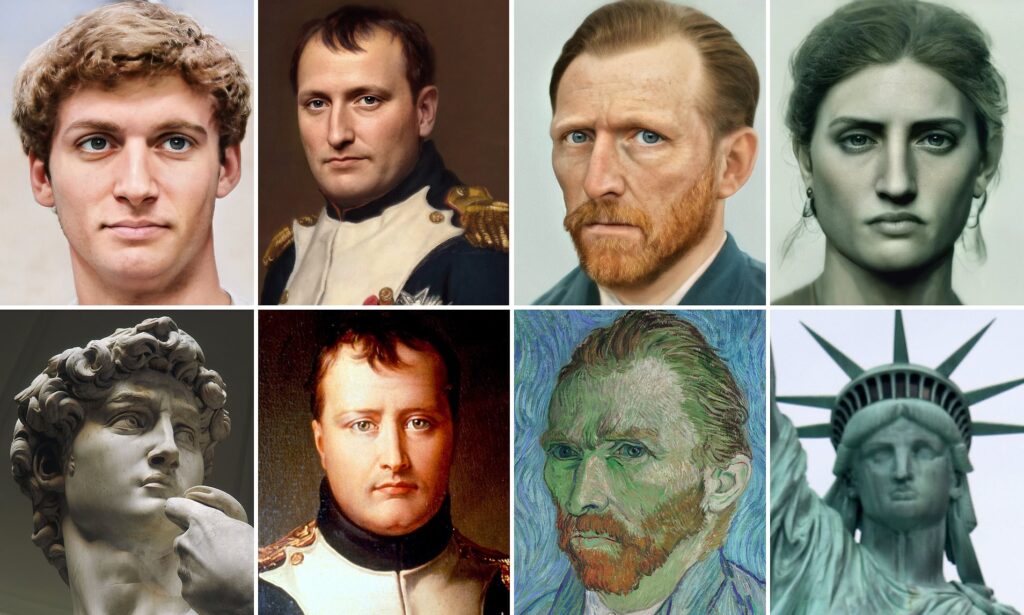Artificial Intelligence, first originated to proffer automation process, extends its hands to medical, education, stock-markets and now to art and sculptures. AI using algorithms for predicting the occurrences, is advantaged by artists, recreating the sculptures/statues by giving real faces to those historical beings.
Two of the artists, Bas Uterwijk, a Dutch Photographer and designer and Dan Voshart, a VR specialist in Film Industry are accredited for rejuvenating the ancients’ faces, a mere algorithm-cum-prediction of ‘how they would have looked like’, deploying AI & Machine Learning software.
Well, Bas Uterwijk’s depiction of Christianity deity, ‘Jesus’ made zealous of appreciating the works by the technology.
How the Artists made so?
Inquiring about the realistic portraits of ancients, artists convey that incorporating all the known information about a person, not only from his/her physical outlooks, extending to geographical and temporal information (place of birth, period of living, history) and colliding them all in a software ‘ArtBreeder’, helped them so, to give life for ancient paintings or statues.
The result shows an ultra-realistic facial look of the great historians, like Alexander the great, George Washington (First President of US), the famous Statue of Liberty and Michelangelo’s David.
Bas Uterwijk about his works on AI
Bas Uterwijk took Instagram and his official site to share his incredible works on recreating great ancient personalities. The efforts of him includes 50-60 images of ancients.
Certainly, the ancient figure that allured viewers in his profile seems out to be, the Christianity god, ‘Jesus’. The Christian idol has been recreated, but a more sensible human face, envisioning the history. While working on the divinity creature, Uterwijk collided the entire information about him to carve the best. He inputs the statue and painting references of the lord, positioning his birth in Bethlehem, 10 km from Jerusalem and the fact that he didn’t stand out from the crowd in any way, which even Bible portrays.
Considering that Jerusalem is situated in the Middle East, a man who did not physically stand out from his average population would follow more or less the same body pattern as the inhabitants of the region. In short, the software used by Uterwijk concluded that Jesus was a man with black skin tones and more conspicuous facial features, while modern representation (due in large part to the Roman expression of Jesus Christ) places him as a white man with straight hair.
Dan Voshart’s portraits of Roman Emperors
Here is another portrait maker, actually a film VR, who turned this lockdown to come out with portraits of ancient Roman Emperors as like real-humans. Dan Voshart too admits of using Artbreeder, which equips Machine Learning method called generative adversarial network (GAN), for his recreations. Precisely he says, “of first working in photoshop, load it into ArtBreeder, tweak it, bring it back to Photoshop, then rework it”.
Dan Voshart affirms the same as Uterwijk, of employing all the known history & sources, besides facial recognitions. The software favors to correlate the data or references, for sketching out the best authentic results. In the case of Voshart, while portraying Maximinus Thrax, he fed in images of the wrestler Andre the Giant. The reason that Voshart explains is, Thrax is diagnosed with pituitary gland disorder in his youth, fetching him a lantern jaw and mountainous frame, history says. Andre the Giant was alco accounted with the same disorder, that made the artist to put forth Andre’s features to thicken the jaw and brow of Thrax. The process, as he describes it, is almost alchemical, relying on a careful mix of inputs to create the finished product.
Epilogue
Artificial Intelligence and Machine Learning not just let portraits of ancients to be realistic but also animations and graphics of placing these ancients in a video sequence. This makes possible to recreate the life of the great people, a more realistic one. Future may hold docudramas of ancient historians, they themselves acting in it, resulting in a good scope in infotainment.
References:
- https://medium.com/@DanielAKeane/artist-uses-ai-to-recreate-faces-of-jesus-christ-and-other-famous-figures-3889a6be5219
- https://www.dailymail.co.uk/femail/article-8479591/Artist-uses-artificial-intelligence-reveal-famous-historical-figures-actually-looked-like.html
- https://www.theverge.com/2020/8/21/21395115/roman-emperors-photorealistic-portraits-ai-artbreeder-dan-voshart
- https://www.thesun.co.uk/tech/12013982/artificial-intelligence-artist-famous-figures/

